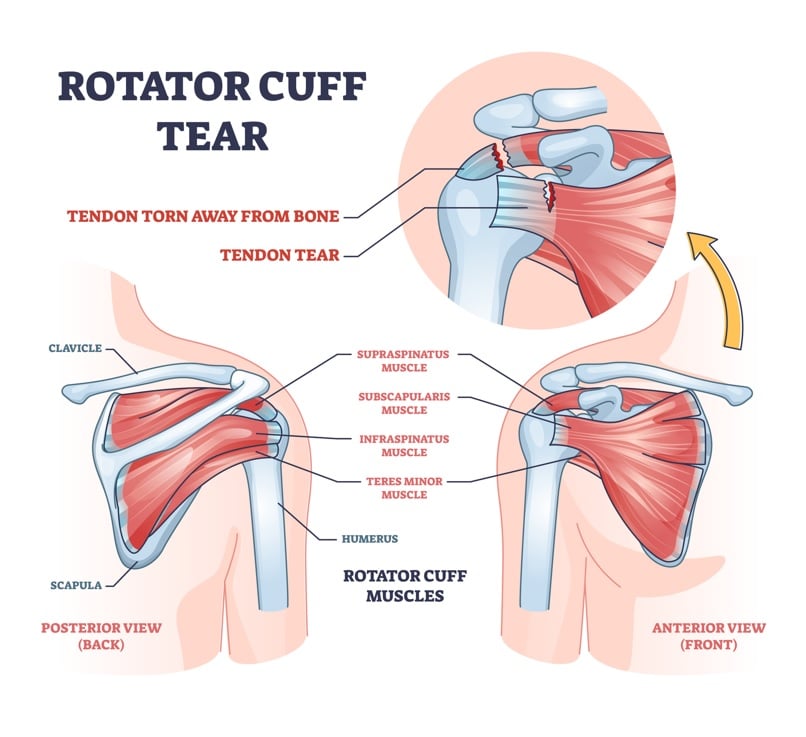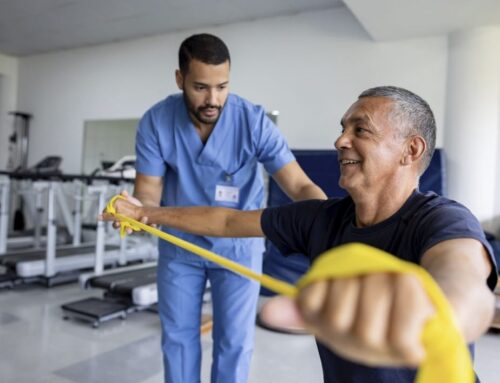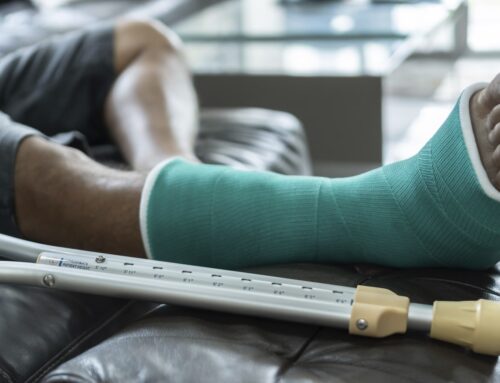Rotator cuff injuries are the most common tendon injury in adults. One-third of adults over 60 have a tear. That number increases to more than half for 80-year-old adults. Rotator cuff injuries can significantly impact daily life, but there are a variety of treatment options that can help.
In this article, Cary Orthopaedic’s shoulder experts will explain what the rotator cuff is, common injuries, how we diagnose a tear and treatment options.
Understanding rotator cuff injuries
According to the American Academy of Orthopaedic Surgeons, nearly two million people in the U.S. experience a rotator cuff tear. This common shoulder injury can make performing daily activities painful and difficult.
“Based on MRI studies of the shoulder that were performed in the last century, it is well known that the majority of people will develop some type of rotator cuff tear over the course of their lifetime, assuming an average lifespan,” says Cary Orthopaedics shoulder specialist Dr. Raymond Carroll.
What is a rotator cuff?
The rotator cuff consists of four muscles that come together as strong tendons. These tendons form a protective “cuff” around the upper part of your arm, connecting it to your shoulder blade. The rotator cuff enables you to lift and rotate your arm, and it stabilizes your shoulder joint.
What causes rotator cuff injuries?
There are two main causes of rotator cuff tears – acute trauma and gradual wear and tear (degeneration) from aging.
Acute tears often happen due to a fall or by lifting or yanking on something heavy with a jerking motion.
Typically, a tear refers to a traumatic event, but most rotator cuff tears and injuries occur as part of the natural aging process. Over time, one or more rotator cuff tendons wear down from use – often in the dominant arm. Repetitive shoulder motions from sports, jobs or chores can lead to tendon degeneration. Early degeneration in the rotator cuff is called tendinosis and can precede a rotator cuff tear.
from use – often in the dominant arm. Repetitive shoulder motions from sports, jobs or chores can lead to tendon degeneration. Early degeneration in the rotator cuff is called tendinosis and can precede a rotator cuff tear.
When one or more of the strong rotator cuff tendons are torn by age or trauma, they begin to detach from your arm bone. This can cause shoulder weakness and rotator cuff pain. Small tears can lead to larger tears because the tendon often begins to fray, spreading the tear further.
Who is at risk for this type of shoulder injury?
Since the majority of tears occur from repetitive use, people over the age of 40 have the greatest risk, and the risk increases as you age. Men tend to have more rotator cuff injuries than women. Family history, smoking and diseases that slow blood flow to the shoulder – like diabetes or hypertension – can also contribute to a rotator cuff injury.
People with occupations that require repetitive shoulder motions or overhead work also have a higher risk of shoulder injuries. Athletes like tennis players, baseball pitchers, rowers and weightlifters also do.
Symptoms of a tear
Symptoms of a tear can include:
- Pain while resting and with movement, especially when lifting or lowering the arm
- Weakness or instability in the shoulder and arm
- A limited range of motion, sometimes leading to a “frozen shoulder”
- A crackling sensation called crepitus during certain shoulder movements
Diagnosing a rotator cuff tear
At your consultation, Cary Orthopaedics’ experienced shoulder team will discuss your symptoms, medical history, job duties and hobbies that might have caused the shoulder injury. Your shoulder specialist will also perform a physical exam to identify tenderness, deformity, range of motion and arm strength.
They may order imaging to see the inside of your shoulder. Imaging may include a shoulder X-ray, ultrasound or MRI. Normally, the first test will be an x-ray to see the bony structure of your shoulder and rule out any other causes of shoulder pain, like arthritis.
Next, your orthopedic doctor may order an ultrasound or MRI to show the soft tissues in your shoulder. These diagnostic tests often reveal the size, location and age of the tear.
Treatment for rotator cuff pain
Toughing out a shoulder injury can cause more damage, so early rotator cuff tear treatment is highly recommended.
Treatment varies depending on the severity of the tear and symptoms. Rotator cuff tears can be treated with both conservative treatments and surgical interventions.
“Many people who are found to have a rotator cuff tear may not need surgery or any other treatment,” said Dr. Carroll. “However, for patients who develop a painful shoulder condition or have an injury that results in a rotator cuff tear, surgery may be the best treatment option.”
Conservative treatments
Many people with rotator cuff pain have mild symptoms, so conservative, non-surgical treatments can work well.
Conservative treatments include:
- Rest and modified activity to promote healing and prevent further damage
- Medications for pain relief and to reduce swelling
- Physical therapy to improve strength and flexibility
- Steroid injections to reduce inflammation
Cary Orthopaedics offers all these conservative treatment options for rotator cuff tear patients. If symptoms are mild to moderate, one of the first treatments shoulder experts recommend is physical therapy.
“Physical therapy is the most commonly recommended treatment for painful shoulder conditions,” said Dr. Carroll.
Physical therapy effectively treats rotator cuff pain and can reduce the need for surgery. One study found that physical therapy significantly improved outcomes, enabling more than 75 percent of patients to avoid surgery.
A physical therapist can help the patient improve function, reduce pain and find long-term relief. Therapeutic exercises target and strengthen the shoulder muscles. Focused stretching improves the range of motion and decreases shoulder stiffness.
Many aspects of physical therapy also promote healing by stimulating blood flow and teaching patients better ways to move to prevent further shoulder problems.
In physical therapy for shoulder pain, your therapist will develop a customized plan that includes exercises, stretches, manual therapy and patient education – like teaching you how to use heat and ice for pain.
Surgery for rotator cuff tears
If you have a large rotator cuff tear, significant weakness in your shoulder or your pain is not improving with conservative treatments, your orthopaedic shoulder doctor may recommend rotator cuff surgery.
“Patients who continue to experience shoulder pain despite therapy will often be directed to have imaging to evaluate for a rotator cuff tear,” said Dr. Carroll. “Studies have shown that this population of patients with a rotator cuff tear do well with surgical treatment.”
Rotator cuff surgery improves shoulder strength and reduces pain for most patients. Rotator cuff surgery reattaches the torn tendon to the upper arm bone (humerus) or trims frayed tendons.
The most common rotator cuff surgeries are traditional open repair and arthroscopic rotator cuff repair.
Traditional open repair surgery is typically required for large or complex rotator cuff tears. This procedure requires a larger incision over the shoulder to detach or split the shoulder muscles to access the torn tendon and repair it.
Arthroscopic repair surgery repairs a torn rotator cuff using a small, high-tech camera that displays images on a screen. The surgeon uses the video images to guide miniature surgical tools to repair the tear. Arthroscopic repairs are typically performed in an outpatient setting and are the least invasive option for rotator cuff surgery.
Following surgery, your orthopedic physician will prescribe medications to decrease pain and physical therapy to help you recover, grow stronger and heal. Recovery from rotator cuff tear surgery can be slow and usually takes several months. Rehabilitation through physical therapy is vitally important to a successful recovery.
Shoulder treatment in Raleigh and Cary
Cary Orthopaedics’ specialists understand the shoulder, a complex ball and socket joint. We care for shoulder patients with personalized treatment plans at our state-of-the-art facilities. We offer a full spectrum of orthopedic services to treat your pain and help you return to the life you love.
Contact Cary Orthopaedics today for a consultation if you or a loved one are experiencing shoulder pain.






